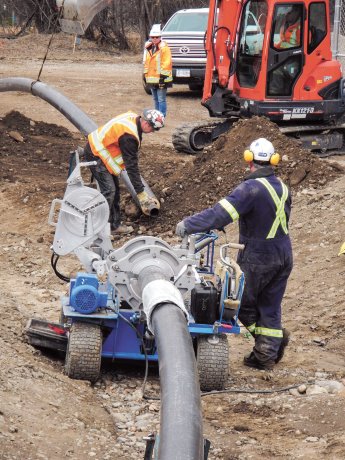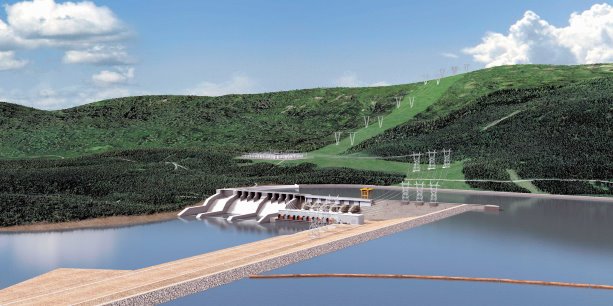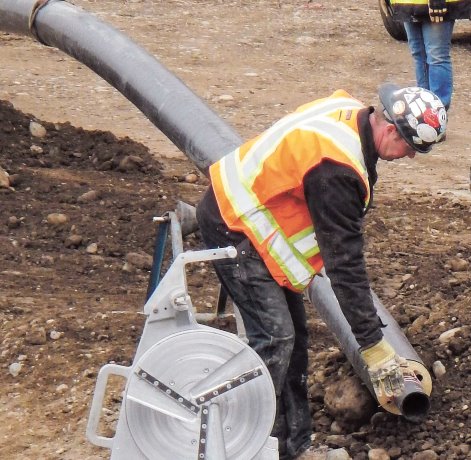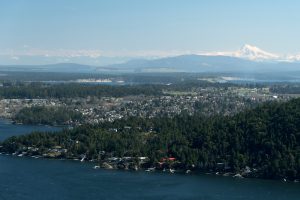A new report looking at the economic impact of Site C led by UBC researchers is calling for the B.C. government to halt the nearly $9-billion project.
In an analysis of the hydroelectric project on the Peace River in northeastern B.C., the report’s authors say Site C is now much more expensive than an alternative consisting primarily of wind power, pumped storage and energy conservation. They state cancelling the project as of June 30 this year would save between $500 million and $1.65 billion, depending on future conditions. The authors conclude it would be wise to suspend construction of Site C and recommend a full review by the B.C. Utilities Commission.
"The business case for Site C is far weaker now than when the project was launched, to the point that the project is now uneconomic," said Karen Bakker, a Canada research chair in political ecology and director of UBC’s program on water governance that prepared the report. "The good news is that we are not past the point of no return, according to our analysis."
Supporters of Site C, like Premier Christy Clark, have said the project is a cost-efficient way to meet increasing electricity demand. But the UBC researchers say their analysis incorporates several key changes since Site C was approved, including a decline in the cost of alternatives such as wind power, and a substantial reduction in BC Hydro’s forecasted need for electricity in 2024 and beyond.
The report — the latest in a series of five — states that, according to BC Hydro’s own forecasts, predicted electricity demand has dropped significantly.
According to the study, Site C electricity will not be fully required for nearly a decade after the project is finished. If demand growth does not keep up with BC Hydro’s current forecasts, power from Site C could remain in surplus indefinitely, the authors state.
"The surplus energy from Site C will have to be exported at prices currently far below cost," said Bakker. "Our analysis shows that, under some of the most likely forecasts, losses from these exports will total $1 billion or more."
Proponents of Site C say that demand will increase because of LNG developments and decarbonizing the economy, such as through the use of electric cars. But the researchers say their analysis indicates otherwise.
"BC Hydro’s own forecasts show that electricity demand will be relatively modest into the 2030s, even including anticipated demands from LNG and electrification of cars," said Bakker.
The report also claims BC Hydro is significantly curtailing its energy conservation programs in response to Site C’s projected energy surplus. Producing new energy with Site C costs three times as much as energy conservation, it reads. But energy conservation could meet a significant amount of new demand for several years, said Bakker.
Researchers at UBC note there are other problems with the project beyond cost and demand. In an earlier report, the authors called on the provincial and federal governments to determine the full impact of the project on treaty rights of the Treaty 8 First Nations who live in the Peace River region.
"Although these communities’ rights are constitutionally protected, we believe they have been systematically downplayed — even ignored — by governments," said Gordon Christie, professor in the Peter A. Allard School of Law at UBC who consulted on the report. "This demonstrates a profound lack of honourable activity by the Crown, where the legal tests in this country now rest on the notion of the ‘honour of the Crown.’ "
While the report states cancelling the Site C Project outright would save British Columbians hundreds of millions of dollars, delaying the commissioning date to the late 2020s is also a possible scenario, said Bakker.
"Therefore, we recommend suspension and review by the B.C. Utilities Commission rather than outright cancellation," said Bakker. "This is a non-partisan, common sense, sober second thought analysis that indicates it’s not too late to hit pause on Site C."
Clark recently visited the project site while on the campaign trail, touting it as a green energy project that is creating jobs.
Clark fired back at the report when reporters asked for comment.
"I guess I would say to those experts, ‘When do they think we should building Site C? After we need the electricity? After it’s too late? Should we start building it 11 years from now or nine years from now?" she stated to them.
The NDP has expressed support for referring the project to the B.C. Utilities Commission while Clark disagrees. The Green Party totally rejects the project, calling it "environmentally, economically and socially reckless."
Due to the B.C. Elections Act, BC Hydro was unable to comment during the election campaign period.
While the debate continues, the project has been going full steam ahead. Voith Hydro Canada, which was awarded a $470-million contract last year, will design, supply and install six vertical axis, Francis-style turbines, six generators and associated equipment.
Turbines and generators convert the power of falling water into electricity, which is then transformed and fed into the provincial electricity grid. These turbines and generators will be custom designed and built to suit the site-specific conditions of the project.
Their initial onsite work will include building a facility at the dam site to manufacture the steel structures for the turbines and generators.
About 150 workers will be onsite during the peak of installation for the turbines and generators in 2022, which will occur in the powerhouse. The majority of this work will be performed by millwrights, electricians, pipefitters and boilermakers, with opportunities for apprentices in each of those trades.

1/2
Pictured are crews working on Site C last year. A recent report from the University of British Columbia argues that the hydroelectric dam project in northern B.C has become more expensive than other options and unnecessary due to forecasted demand.
Photo: Province of B.C.
2/2
A rendering shows the Site C generating station and spillway. Voith Hydro Canada was awarded a $470-million contract in March 2016. Voith will design










Recent Comments
comments for this post are closed